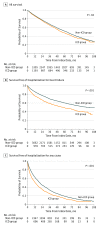Long-term Outcomes Associated With Implantable Cardioverter Defibrillator in Adults With Chronic Kidney Disease
- PMID: 29404570
- PMCID: PMC5885920
- DOI: 10.1001/jamainternmed.2017.8462
Long-term Outcomes Associated With Implantable Cardioverter Defibrillator in Adults With Chronic Kidney Disease
Abstract
Importance: Chronic kidney disease (CKD) is common in adults with heart failure and is associated with an increased risk of sudden cardiac death. Randomized trials of participants without CKD have demonstrated that implantable cardioverter defibrillators (ICDs) decrease the risk of arrhythmic death in selected patients with reduced left ventricular ejection fraction (LVEF) heart failure. However, whether ICDs improve clinical outcomes in patients with CKD is not well elucidated.
Objective: To examine the association of primary prevention ICDs with risk of death and hospitalization in a community-based population of potentially ICD-eligible patients who had heart failure with reduced LVEF and CKD.
Design, settings, and participants: This noninterventional cohort study included adults with heart failure and an LVEF of 40% or less and measures of serum creatinine levels available from January 1, 2005, through December 31, 2012, who were enrolled in 4 Kaiser Permanente health care delivery systems. Chronic kidney disease was defined as an estimated glomerular filtration rate of less than 60 mL/min/1.73 m2. Patients who received and did not receive an ICD were matched (1:3) on CKD status, age, and high-dimensional propensity score to receive an ICD. Follow-up was completed on December 31, 2013. Data were analyzed from 2015 to 2017.
Exposures: Placement of an ICD.
Main outcomes and measures: All-cause death, hospitalizations due to heart failure, and any-cause hospitalizations.
Results: A total of 5877 matched eligible adults with CKD (1556 with an ICD and 4321 without an ICD) were identified (4049 men [68.9%] and 1828 women [31.1%]; mean [SD] age, 72.9 [8.2] years). In models adjusted for demographics, comorbidity, and cardiovascular medication use, no difference was found in all-cause mortality between patients with CKD in the ICD vs non-ICD groups (adjusted hazard ratio, 0.96; 95% CI, 0.87-1.06). However, ICD placement was associated with increased risk of subsequent hospitalization due to heart failure (adjusted relative risk, 1.49; 95% CI, 1.33-1.60) and any-cause hospitalization (adjusted relative risk, 1.25; 95% CI, 1.20-1.30) among patients with CKD.
Conclusions and relevance: In a large, contemporary, noninterventional study of community-based patients with heart failure and CKD, ICD placement was not significantly associated with improved survival but was associated with increased risk for subsequent hospitalization due to heart failure and all-cause hospitalization. The potential risks and benefits of ICDs should be carefully considered in patients with heart failure and CKD.
Conflict of interest statement
Figures


Comment in
-
Utility of implantable cardioverter defibrillators in chronic kidney disease.Kidney Int. 2018 May;93(5):1028-1030. doi: 10.1016/j.kint.2018.03.001. Epub 2018 Mar 17. Kidney Int. 2018. PMID: 29559162 No abstract available.
References
-
- United States Renal Data System Coordinating Center. United States Renal Data System 2017 Annual Data Report. https://www.usrds.org/adr.aspx. Accessed December 1, 2017.
-
- Go AS, Chertow GM, Fan D, McCulloch CE, Hsu CY. Chronic kidney disease and the risks of death, cardiovascular events, and hospitalization. N Engl J Med. 2004;351(13):1296-1305. - PubMed
-
- Kottgen A, Russell SD, Loehr LR, et al. Reduced kidney function as a risk factor for incident heart failure: the Atherosclerosis Risk in Communities (ARIC) study. J Am Soc Nephrol. 2007;18(4):1307-1315. - PubMed
-
- Gottdiener JS, Arnold AM, Aurigemma GP, et al. Predictors of congestive heart failure in the elderly: the Cardiovascular Health Study. J Am Coll Cardiol. 2000;35(6):1628-1637. - PubMed
Publication types
MeSH terms
LinkOut - more resources
Full Text Sources
Other Literature Sources
Medical

